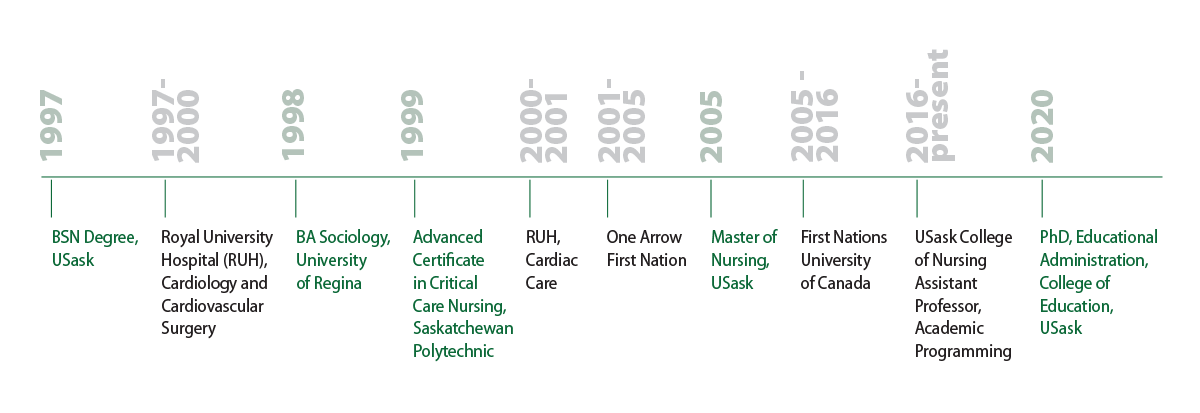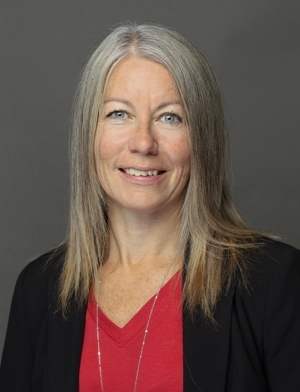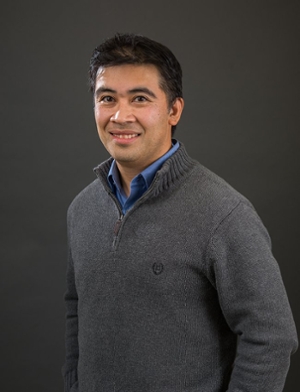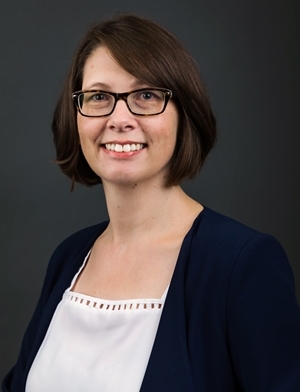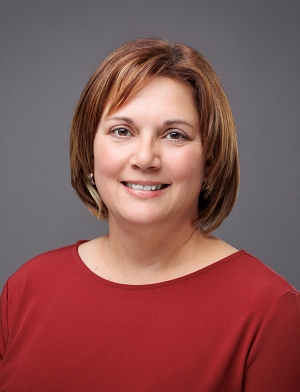
Celebrating 25 Years of Nursing
Four nursing faculty look back on 25 years of nursing.
Turn back the clock to 1997. A class of 87 nursing students are about to complete their University of Saskatchewan (USask) Bachelor of Science in Nursing degree and embark on their nursing career.
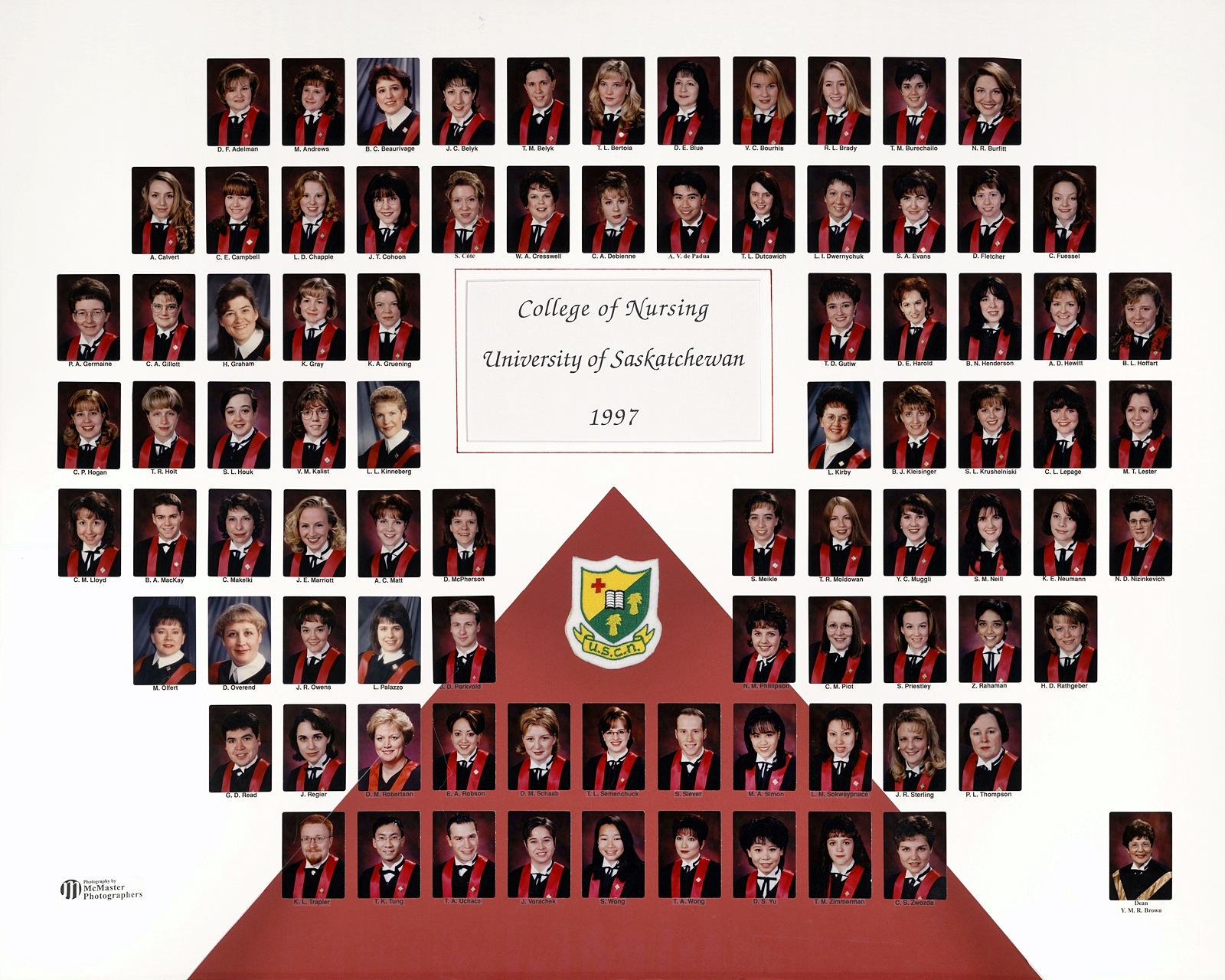
Fast forward to 2022. Four of those graduates are now teaching University of Saskatchewan nursing students, educating the future nurses of Saskatchewan, Canada, and the world.
Congratulations to Tania Bergen, Dr. Anthony de Padua, Dawna Fletcher-Tung, and Dr. Tania Kristoff on 25 years of nursing!
As we celebrate 2022 National Nursing Week, we sit down to learn about these graduates, who are now faculty at the USask College of Nursing.
When you completed your first nursing degree, what area of nursing did you expect to practice in?
Tania B - I had planned on going directly into ICU at Royal University Hospital in Saskatoon; however, I was hired at City Hospital on Urology and General Surgery. I ended up going into ICU at City Hospital 8 months later. This was the best thing that happened to me, as I had the most amazing mentors and support in this unit.
Anthony - When I first started nursing, I wanted to get some experience on medical/surgical floors, as I recognized I needed to solidify my medical/surgical nursing skills before I looked at other areas to work in. There were no full-time positions, so I picked up full-time hours on a surgical floor. About a year later, I took a half-time position in pediatrics, while continuing to work as a surgical/medical nurse. I tried to get on in ICU, but the manager said I needed at least 2-3 years of experience. Working casual and trying various areas of nursing was beneficial for my career because it gave me the opportunity to explore all the different paths of nursing.
Dawna - Prior to starting my degree, I hoped to practice community health nursing. As I went through the program, I enjoyed my community placements the most and knew this was the right fit for me. I needed some experience prior to community health nursing, so I started in acute care at City Hospital in Saskatoon on a surgical floor. The following summer I moved to Moose Jaw for full-time work in community health.
Tania K - When I began my nursing career, I wanted to provide direct patient care in a challenging and exciting area. Subsequently, my practice started in cardiology. I enjoyed taking care of people, listening to their concerns, and collaborating with other health care professionals. I appreciated that I learned something new from my colleagues and patients every day.
Why did you initially choose to become a nurse?
Tania B - I had intentions of becoming a teacher up until September of Grade 12 when I had a personal experience that changed my life. I lost a good friend in a car accident and I recall sitting in the waiting room with friends hearing her scream at the ER staff. I felt extremely helpless and alone – no one paid any attention to us, and being 16, our friend circle was our lifeline. It was that moment I decided I wanted to be an ER nurse, and one that was holistic and would have helped direct the lost friends to the appropriate supports or know what to say to help us cope better. Needless to say, I never made it to the ER as a staff nurse, but the experience pointed me in the right direction. My personality was a better fit for ICU and obviously, teaching was and still is a passion of mine.
Anthony - I was interested in the health care field and wanted to help people. I had family members who worked in health care and it intrigued me.
Dawna - I don’t recall any one defining moment as to why I went into nursing. I had decided in high school this was my path, and no doubt I was greatly influenced by the nurses in my life, especially my aunt, who has recently retired from nursing education, and a neighbor nurse for whom I babysat as a teenager. I remember, as soon as her children were in bed, I would pour over the nursing and pregnancy books I found on her bookshelf – it was endlessly fascinating as a teenager.
Tania K - My initial reason for becoming a nurse was because I wanted to help people and make a difference in their lives. Once I was in the undergraduate program, I was surprised to learn about the endless opportunities in nursing.
If you had to pick ONE highlight of your career so far, what would that be?
Tania B - Publication award for my graduate work from the Canadian Association of Critical Care Nurses. My work focused on quality of life in ICU survivors, most specifically those in sepsis. That work in 2005 has now come full circle during this pandemic. I have received over a dozen requests to read my work, since many of these qualities are being discovered in COVID survivors.
Anthony - I’m very excited to be working and researching with community organizations, clients, and families to address their needs and to explore how the current health care systems can be challenged and changed. My research is definitely my highlight so far.
Dawna - Completing my graduate nursing education. I really enjoyed working as a registered nurse, but I always felt there was something more for me. I am proud that I didn’t let that feeling pass me by and that I completed my master of nursing, bringing me to the point in my career that I am now.
Tania K - One of the biggest highlights in my career was when I collaborated with Elders and First Nations social workers to develop and implement a simulation-based experience. The purpose of the simulation was to share First Nations knowledge and cultural practices with nursing students. Although the process required much time and effort, it turned out to be a meaningful learning activity.
What have you enjoyed the most about your nursing career?
Tania B - Watching students at the end of a clinical course or program when they have figured it out and are blossoming as autonomous and holistic practitioners. Watching their growth and success is such a reward.
Anthony - I have enjoyed seeing the rewarding changes I have made through direct patient care I have provided to patients and families. I am still surprised when family members approach me saying how they remember how I cared for them or their family members in the past. I’ve also enjoyed working with communities and organizations to help them discuss and brainstorm ways to address health care issues in their communities. Of course, I also love meeting and teaching my students, who continually remind me of their passions on why they have entered nursing education.
Dawna - My absolute favourite aspect of my career so far has been working with both first time parents and with new nursing students. While these are obviously very different experiences – they have in common a time of new beginnings, new learning, and new challenges. I aim to be a positive support, guide, and educator through these new experiences.
Tania K - I have enjoyed the relationships I have developed with students and patients. Outside of the hospital and classroom, I have connected with these individuals in grocery stores and restaurants. It is gratifying to see students and patients doing well and living out their lives.
Where do you see the rest of your nursing career heading?
Tania B - I love teaching nursing. I do not see me changing my role. The amazing thing about nursing education is that it is constantly evolving, and so am I.
Anthony - I see myself continuing my research and scholarship with issues around HIV, homelessness, and addictions. My research is around issues that pertain to Saskatchewan, but I see my work spilling over to other areas in Canada. In this part of my career, I also see myself considering broader nursing issues, such as how to promote more men in nursing and how I can improve nursing environments for others like those who are internationally educated and those nurses who face issues with equity, diversity, and inclusivity.
Dawna - I anticipate continuing in nursing education and continuing to further develop my practice as an educator. I am also looking forward to the post-pandemic world and changes that will come. In particular, I have a project for my NURS 431 community clinical that was not suitable during COVID restrictions, so I hope to begin planning this spring to move forward next fall.
Tania K - I plan to continue in academia, focusing on teaching and mentoring future nurses. I also see myself actively contributing to nursing knowledge and the scholarship of teaching and learning.
What made you choose academia?
Tania B - I had the most amazing clinical instructor when I was in Year 3. She was a nurse at heart, but was so passionate about helping us grow as people. I wanted to be just like her, but I never thought I would give up clinical nursing to work in academia full-time. One day while working in ICU, I realized how little leadership and influence I had at the bedside. I could influence change in my assigned patient that day, but it wasn’t enough for me. I realized if I wanted to make the profession of nursing great, I needed to influence more people. I believe I am here in academia to have greater influence over the profession.
Anthony - I wanted to teach and to conduct meaningful research.
Dawna - I had always thought education was something I would like. There is a significant amount of client education in community health nursing and this is the aspect of community health nursing I enjoyed the most. When I worked as a Healthy Beginnings nurse, we often had instructor-led groups of nursing students in our health centre. I enjoyed going with students on home visits and being a small part of their education. I am very happy to now have a bigger role in nursing education and bring students into community placements.
Tania K - Before coming to academia, I was employed as a community health nurse. As a community health nurse, I spent much of my time acquiring and sharing knowledge with my patients, developing a passion for learning. After I completed my master’s degree, I took a position in academia with the desire to continue to learn, teach and mentor future nurses, and make the profession of nursing better.
When nursing students ask your advice about the profession, what’s one piece of advice you like to give?
Tania B - There are so many things I want to tell students, but I think the most valuable is “be true to yourself”. Students always have a fresh perspective on practice - and that can easily get lost in the day-to-day ware of the profession. Take care of yourself and never let go of the original perception you had.
Anthony - Find your passion in both nursing and in life and embrace them!
Dawna - I want to reinforce the importance of community in nursing practice. I often tell students as they move from their final community clinical to remember no matter what practice area you are in or what population you serve, every client lives in and returns to community. And also, when they begin nursing, reach out and ask for help – don’t do it alone - there is a nursing community around you, cheering you on, wanting you to succeed.
Tania K - Nursing is a diverse profession full of career possibilities. Keep learning, be flexible, and willing to try new things.
These four alumni have continued their education and worked in a variety of positions and organizations over the past 25 years. Please see below a timeline highlighting education and employment history for each alumnus.
Tania Bergen (RN, BSN, MN) is an instructor at the Saskatoon Campus.
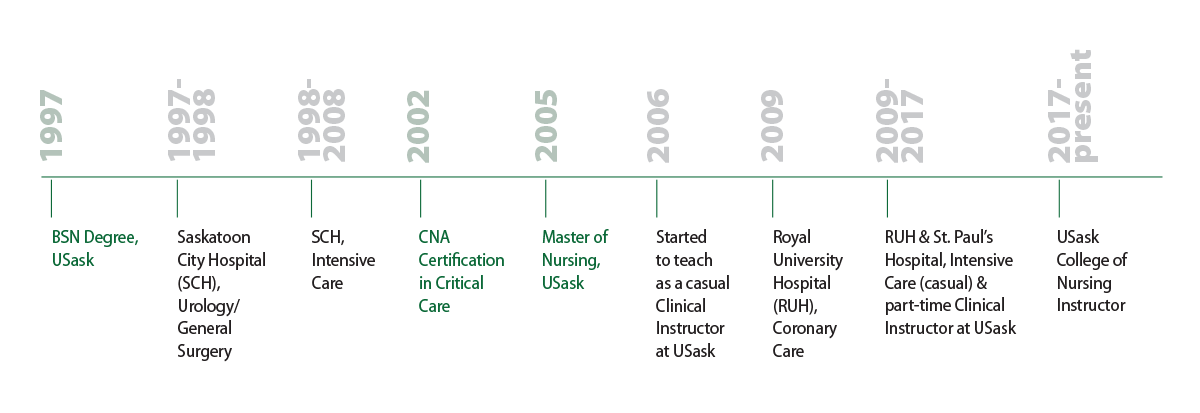
Dr. Anthony de Padua (RN, BScN, MSc, PhD) is an assistant professor at the Prince Albert Campus.
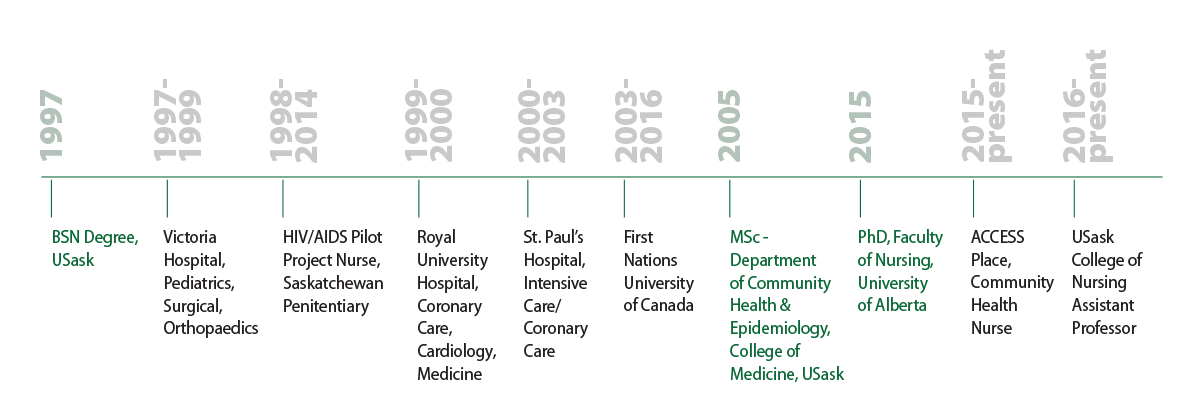
Dawna Fletcher-Tung (RN, BSN, MN) is an instructor at the Saskatoon Campus.
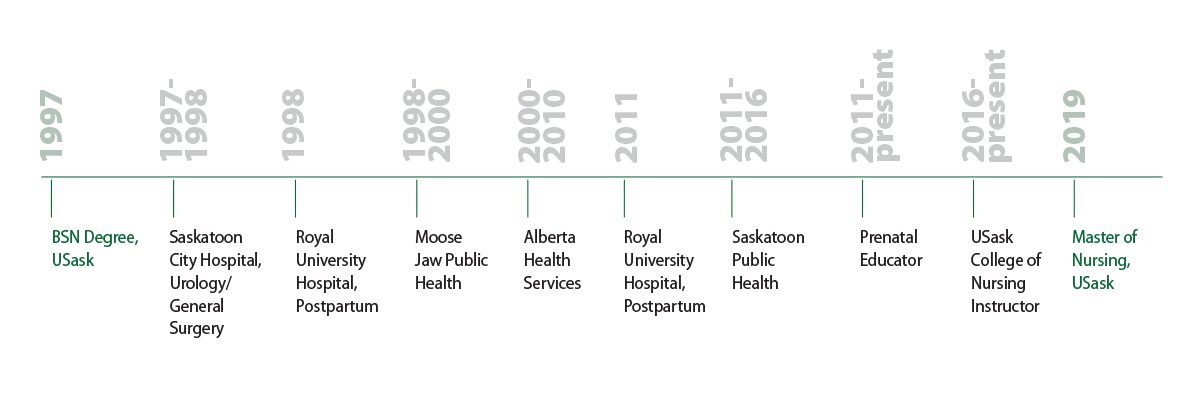
Dr. Tania Kristoff (RN, BSN, BA, MN, PhD, CCSNE) is an assistant professor – academic programming at the Prince Albert Campus.
